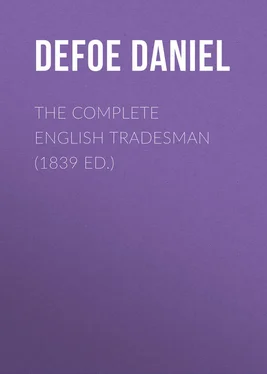Daniel Defoe - The Complete English Tradesman (1839 ed.)
Здесь есть возможность читать онлайн «Daniel Defoe - The Complete English Tradesman (1839 ed.)» — ознакомительный отрывок электронной книги совершенно бесплатно, а после прочтения отрывка купить полную версию. В некоторых случаях можно слушать аудио, скачать через торрент в формате fb2 и присутствует краткое содержание. Жанр: foreign_antique, foreign_prose, на английском языке. Описание произведения, (предисловие) а так же отзывы посетителей доступны на портале библиотеки ЛибКат.
- Название:The Complete English Tradesman (1839 ed.)
- Автор:
- Жанр:
- Год:неизвестен
- ISBN:нет данных
- Рейтинг книги:3 / 5. Голосов: 1
-
Избранное:Добавить в избранное
- Отзывы:
-
Ваша оценка:
- 60
- 1
- 2
- 3
- 4
- 5
The Complete English Tradesman (1839 ed.): краткое содержание, описание и аннотация
Предлагаем к чтению аннотацию, описание, краткое содержание или предисловие (зависит от того, что написал сам автор книги «The Complete English Tradesman (1839 ed.)»). Если вы не нашли необходимую информацию о книге — напишите в комментариях, мы постараемся отыскать её.
The Complete English Tradesman (1839 ed.) — читать онлайн ознакомительный отрывок
Ниже представлен текст книги, разбитый по страницам. Система сохранения места последней прочитанной страницы, позволяет с удобством читать онлайн бесплатно книгу «The Complete English Tradesman (1839 ed.)», без необходимости каждый раз заново искать на чём Вы остановились. Поставьте закладку, и сможете в любой момент перейти на страницу, на которой закончили чтение.
Интервал:
Закладка:
Hence, besides the great number of wealthy merchants who carry on this great foreign negoce [ negotium (Latin) business], and who, by their corresponding with all parts of the world, import the growth of all countries hither – I say, besides these, we have a very great number of considerable dealers, whom we call tradesmen, who are properly called warehouse-keepers, who supply the merchants with all the several kinds of manufactures, and other goods of the produce of England, for exportation; and also others who are called wholesalemen, who buy and take off from the merchants all the foreign goods which they import; these, by their corresponding with a like sort of tradesmen in the country, convey and hand forward those goods, and our own also, among those country tradesmen, into every corner of the kingdom, however remote, and by them to the retailers, and by the retailer to the last consumer, which is the last article of all trade. These are the tradesmen understood in this work, and for whose service these sheets are made public.
Having thus described the person whom I understand by the English tradesman, it is then needful to inquire into his qualifications, and what it is that renders him a finished or complete man in his business.
1. That he has a general knowledge of not his own particular trade and business only – that part, indeed, well denominates a handicraftsman to be a complete artist; but our complete tradesman ought to understand all the inland trade of England, so as to be able to turn his hand to any thing, or deal in any thing or every thing of the growth and product of his own country, or the manufacture of the people, as his circumstances in trade or other occasions may require; and may, if he sees occasion, lay down one trade and take up another when he pleases, without serving a new apprenticeship to learn it.
2. That he not only has a knowledge of the species or kinds of goods, but of the places and peculiar countries where those goods, whether product or manufacture, are to be found; that is to say, where produced or where made, and how to come at them or deal in them, at the first hand, and to his best advantage.
3. That he understands perfectly well all the methods of correspondence, returning money or goods for goods, to and from every county in England; in what manner to be done, and in what manner most to advantage; what goods are generally bought by barter and exchange, and what by payment of money; what for present money, and what for time; what are sold by commission from the makers, what bought by factors, and by giving commission to buyers in the country, and what bought by orders to the maker, and the like; what markets are the most proper to buy every thing at, and where and when; and what fairs are proper to go to in order to buy or sell, or meet the country dealer at, such as Sturbridge, Bristol, Chester, Exeter; or what marts, such as Beverly, Lynn, Boston, Gainsborough, and the like.
In order to complete the English tradesman in this manner, the first thing to be done is lay down such general maxims of trade as are fit for his instruction, and then to describe the English or British product, being the fund of its inland trade, whether we mean its produce as the growth of the country, or its manufactures, as the labour of her people; then to acquaint the tradesman with the manner of the circulation where those things are found, how and by what methods all those goods are brought to London, and from London again conveyed into the country; where they are principally bought at best hand, and most to the advantage of the buyer, and where the proper markets are to dispose of them again when bought.
These are the degrees by which the complete tradesman is brought up, and by which he is instructed in the principles and methods of his commerce, by which he is made acquainted with business, and is capable of carrying it on with success, after which there is not a man in the universe deserves the title of a complete tradesman, like the English shopkeeper.
CHAPTER I
THE TRADESMAN IN HIS PREPARATIONS WHILE AN APPRENTICE
The first part of a trader's beginning is ordinarily when he is very young, I mean, when he goes as an apprentice, and the notions of trade are scarcely got into his head; for boys go apprentices while they are but boys; to talk to them in their first three or four years signifies nothing; they are rather then to be taught submission to families, and subjection to their masters, and dutiful attendance in their shops or warehouses; and this is not our present business.
But after they have entered the fifth or sixth year, they may then be entertained with discourses of another nature; and as they begin then to look forward beyond the time of their servitude, and think of setting up and being for themselves, I think then is the time to put them upon useful preparations for the work, and to instruct them in such things as may qualify them best to enter upon the world, and act for themselves when they are so entered.
The first thing a youth in the latter part of his time is to do, is to endeavour to gain a good judgment in the wares of all kinds that he is likely to deal in – as, for example, if a draper, the quality of cloths; if a stationer, the quality of papers; if a grocer, the quality of sugars, teas, &c.; and so on with all other trades. During the first years of a young man's time, he of course learns to weigh and measure either liquids or solids, to pack up and make bales, trusses, packages, &c., and to do the coarser and laborious part of business; but all that gives him little knowledge in the species and quality of the goods, much less a nice judgment in their value and sorts, which however is one of the principal things that belong to trade.
It is supposed that, by this time, if his master is a man of considerable business, his man is become the eldest apprentice, and is taken from the counter, and from sweeping the warehouse, into the counting-house, where he, among other things, sees the bills of parcels of goods bought, and thereby knows what every thing costs at first hand, what gain is made of them, and if a miscarriage happens, he knows what loss too; by which he is led of course to look into the goodness of the goods, and see the reason of things: if the goods are not to expectation, and consequently do not answer the price, he sees the reason of that loss, and he looks into the goods, and sees where and how far they are deficient, and in what; this, if he be careful to make his observations, brings him naturally to have a good judgment in the goods.
If a young man neglects this part, and passes over the season for such improvement, he very rarely ever recovers it; for this part has its season, and that more remarkable than in many other cases, and that season lost, never comes again; a judgment in goods taken in early, is never lost, and a judgment taken in late is seldom good.
If the youth slips this occasion, and, not minding what is before him, goes out of his time without obtaining such a skill as this in the goods he is to deal in, he enters into trade without his most useful tools, and must use spectacles before his time.
For want of this knowledge of the goods, he is at a loss in the buying part, and is liable to be cheated and imposed upon in the most notorious manner by the sharp-sighted world, for his want of judgment is a thing that cannot be hid; the merchants or manufacturers of whom he buys, presently discover him; the very boys in the wholesalemen's warehouses, and in merchant's warehouses, will play upon him, sell him one thing for another, show him a worse sort when he calls for a better, and, asking a higher price for it, persuade him it is better; and when they have thus bubbled him, they triumph over his ignorance when he is gone, and expose him to the last degree.
Читать дальшеИнтервал:
Закладка:
Похожие книги на «The Complete English Tradesman (1839 ed.)»
Представляем Вашему вниманию похожие книги на «The Complete English Tradesman (1839 ed.)» списком для выбора. Мы отобрали схожую по названию и смыслу литературу в надежде предоставить читателям больше вариантов отыскать новые, интересные, ещё непрочитанные произведения.
Обсуждение, отзывы о книге «The Complete English Tradesman (1839 ed.)» и просто собственные мнения читателей. Оставьте ваши комментарии, напишите, что Вы думаете о произведении, его смысле или главных героях. Укажите что конкретно понравилось, а что нет, и почему Вы так считаете.












